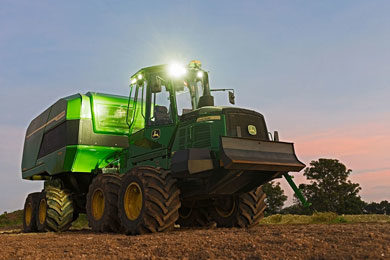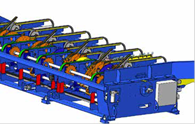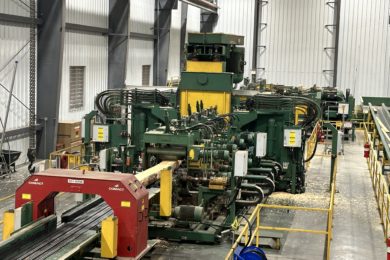Broader focus on silviculture
With the increased importance that the global Forest Industry has on the decarbonization of the atmosphere, and in order to help global forestry customers meet the growing demand for sustainably sourced, cost-effective wood products, John Deere Forestry has shifted its strategic focus from forest harvesting to include the entire Forestry Production System.
This is not new at John Deere, since their agriculture team has successfully leveraged Production System thinking to develop a host of technology-driven products that have significantly improved agricultural yield and efficiency, while reducing input costs for farmers.
Applying this holistic thinking to the forest industry, it was clear that the forest harvesting segment has experienced a significant improvement in productivity, efficiency, and safety through mechanization over the past four decades. Forest harvesting has undergone a significant transformation, but silviculture is an area of the overall Forestry Production System that hasn’t experienced much change.
As John Deere Forestry explored this further with customers and forest owners worldwide, it was clear that increased urbanization was making it increasingly difficult to attract and retain forest workers for the labour-intensive jobs typically found in silviculture. In some regions, especially those that have experienced higher than normal forest losses due to the effects of climate change (forest fire, insect infestations, drought etc.), silviculture activities are so constrained by the labour shortage that it is putting significant pressure on maintaining the exceptional history of sustainably managing the forest ecosystem.
John Deere Forestry saw an opportunity to leverage their experience with mechanized forest harvesting and the development of precision soil preparation, planting and spraying technology for agriculture and apply it to silviculture.
Brazilian forests as a starting point
Like all significant change activities, you have to start somewhere. In discussions with forest customers worldwide, they saw a good opportunity to work with Brazil’s forestry industry primarily because they have very organized silvicultural activities, their plantation forestry infrastructure is well defined, and their forests have very short rotation times – which provides John Deere with quick feedback on the positive and any potential negative impacts of mechanized silviculture. Additionally, there was considerable “pull” from Brazil’s forest industry for mechanized silviculture solutions to help them meet the growth of the eucalyptus plantation forest area over the coming decade.
According to the latest survey by the Brazilian Tree Industry (Ibá, January 2022), the Brazilian forestry sector has 9.5 million hectares of productive forests. In addition to the significant investment in sustainably managed productive forests, Brazil’s forest industry has also developed another 6 million hectares of native forest, exclusively for conservation and providing a natural habitat for native species.
Mechanized planting as a solution to challenges?
Leveraging customer-focused processes, developed by the John Deere Ag Advanced Marketing team, they mapped the entire Silviculture Production System and looked at the areas where customers were experiencing the biggest challenges. They also looked at where the biggest opportunities existed for customers to improve productivity and efficiency. Comparing the challenges and the opportunities, they quickly identified that mechanized planting provided one of the biggest opportunities for Brazilian customers to meet the challenges they were facing.
They assembled a small, highly talented team by bringing together people with experience in Forestry, Agriculture and Construction equipment development. Working closely with customers, this team managed to quickly create a concept Mechanized Seedling Planter that was initially sent for customer testing in early 2020. Unfortunately, the global pandemic stopped our testing and they had to reassemble their efforts during the pandemic based on very limited customer feedback.
Promising test results John Deere Forestry were able to resume field testing after the global travel restrictions were lifted. They presented the concept Mechanized Seedling Planter to many customers at the Florestal 2022 forestry show in Três Lagoas, Mato Grosso do Sul, Brazil, in May 2022.
The Mechanized Seedling Planter is currently undergoing further customer testing. Initial feedback is very favourable, and they are on track to meet the customer’s request to be able to plant one hectare of forest per hour and significantly reduce manual labour by approximately 90%. In order to achieve these results, they integrated several technologies leveraged directly from Agriculture, such as automated path planning and steering, which simplifies the operation of the machine and improves the overall quality of the planting.
Continuous development for healthier forests The Mechanized Seedling Planter is designed to be adaptable to different species and is intended to be used in different forestry markets around the world. The planter is built on the 1510G forwarder that is in serial production at the Joensuu factory in Finland. The 1510G’s performance and ergonomics provide an industry leading platform for the silviculture solutions Deere is developing.
Mechanized planting is only the beginning; through the leverage of Agriculture technologies, there are further opportunities to improve the productivity and efficiency, while reducing input costs for forest owners. Emerging technologies like the recently released John Deere See and Spray™ have significant potential to further reduce the cost of silviculture activities while improving the health of the forest.
Recent trial results for local foresters
As part of this year’s eagerly awaited ForestTECH 2024 series in November where research, trial results and operational lessons from mechanised tree planting are going to be unveiled to local foresters, Matti Tarkka, Program Manager, John Deere Forestry, Silviculture Projects, John Deere, Finland will be outlining in greater detail the testing results from the John Deere Mechanized Seedling Planter from Brazilian forests and plans for the new planting machine in this part of the world.
Details on the content and coverage for the 20-21 November Rotorua, New Zealand event and 26-27 November 2024 event running in Melbourne, Australia the week after, can now be found on the 2024 ForestTECH 2024 website.
To read more Tree Planting related posts click here.
To read more John Deere related posts click here.




